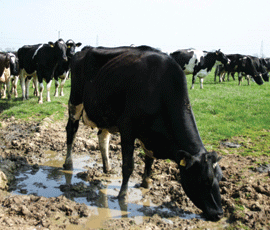Cattle producers warned of anthelmintic resistance

Sheep producers have long been warned about the risk of anthelmintic resistance when worming their animals, but now cattle producers are being told they are in danger of going down the same slippery slope.
In fact, a 2010 survey of cattle farms in Scotland, carried out by researchers at the Moredun Institute in Edinburgh, has revealed signs of anthelmintic resistance against some of the ivermetcin-based products traditionally used to treat the common cattle gut worm Cooperia.
Speaking at a press briefing, the institute’s Jacqui Matthews said the survey highlighted the fact many cattle farmers were using wormers too much and said there was a need for vets and suitably qualified persons (SQPs) to work together with farmers to try and reverse this trend.
“Farmers tend to be using wormers mostly from the one class, which is bad news for sustainable control because they need to be using the different classes of wormers available to prevent resistance,” she added.
“We need to get the message across to producers that they need to stop and think about what they are doing to treat worms, and speak to their vet or a SQP to make sure they are using the right products.”
As a result of the survey, researchers from the Scottish institute are now conducting another survey across cattle farms throughout the UK to further investigate anthelmintic resistance in cattle, with the aim of improving the current diagnostic tests available for detecting wormer resistance.
Dr Matthews added: “We need to continue with vaccine development for roundworms in cattle and help develop tools to help farmers make informed decisions about what wormers to use.”
She advised cattle producers to carry out faecal egg counts to ascertain the worm burden in their herds, before working together with their vets or a SQP to identify a suitable worming treatment for their farm.
For more information on effective worm control, visit the Farmers Weekly academy on the subject.
